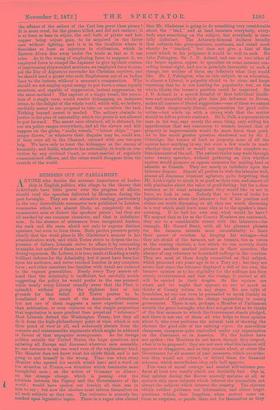TOPICS OF THE DAY.
KIDNAPPING AND PIRACY.
THERE is not now, we believe, in the world, one pirate vessel commanded by a European. In the far corners of the Eastern Archipelago, in the less frequented Chinese waters, and in the Persian Gulf, small vessels manned by Malays, or Arabs, or Manillamen may still attack defenceless coasters, and may number among their crews some outcast European or American ; but the pirate of the ancient type, who dared intercept an Indiaman, and carried guns, and could make himself annoying to a maritime power, is absolutely extinct, as extinct as the buccaneer who could exact ransom from a city. The most gainful and picturesque of all forms of daring crime, which from age to age for more than two thousand years has attracted the pick of the adventurous scoundrels of the world, which only a hundred years ago taxed even the British Fleet, has been totally suppressed, not by opinion, for opinion was never violent against piracy, but by force. The Governments of the world were inconvenienced by piracy, and their steady, persistent, remorseless pressure, pressure exercised by shot and pike and rope, has stamped out one of the oldest of all forms of crime. It is perfectly easy to stamp out the still more wicked, though less inconvenient crime of Kidnapping, and it will be to the disgrace of the civilised Powers if this is not immediately done, and done by the method which has proved so successful against piracy. Almost for the first time in history it has become possible to act on the advice offered by Lord Brougham forty years ago, and declare the kidnapping of human beings by sea-going vessels piracy, to be punished in any port, after trial, with the highest sentence of the law. England has always been prepared for this step ; the United States has become entirely of the same mind ; the French, German, and Russian Governments have no interest in longer toleration ; the Spanish Ministry, however timid about dealing with slavery in Cuba, is sincere in its desire to forbid kidnapping ; the Brazilian Empire has ceased to import slaves ; and the only doubtful powers, Portugal and Peru, must yield to the general verdict of the civilised world. It is, we believe, perfectly possible for Lord Granville, who is exert- ing himself heartily to put down the slave trade in Eastern Africa, to obtain an agreement from all the civilised Powers establishing a code of two or three clauses which in five years would stamp the crime out everywhere—would put down kidnapping in Zanzibar, in the Feejee Islands, and in the Archipelago, and relieve humanity finally of an intolerable burden. It is for England to take the initia- tive in this work, not only because opinion here is matured upon the subject, not only because she has for half a century led the way—Gallios like Lord Palmerston being on this point as determined as the most fervent of philanthropists —but because it is the one cosmopolitan work of chivalry and disinterestedness she feels just now competent to perform. Nothing lowers the standard of a nation's character like the abne- gation of every duty to the world, and it is to this selfish seclu- sion that this country, "weary," the Germans say, "of action," weary, as we should say, of the contrast between the grandeur of its external history and the wretchedness of sections of its people, now rapidly tends. We have surrendered the guardianship of feeble States, the defence of freedom, and even the protection of the Protestant faith, and are fast becoming convinced that nothing is worth an effort except the preservation of our Trade. The suppression of kidnapping throughout the world is, however, a duty we can still, if we please, perform, for it is one on which the public mind is not seriously divided, or divided only by disagreement as to the expedient method.
The necessity for such a measure as that we have proposed has been patent to all who knew the circumstances for many years. It is more than twelve years since a Parliamentary Com- mittee of Inquiry into the Chinese Coolie trade—an organised system of kidnapping, carried on by villains of all nations, in order to exempt Peru from taxation—revealed horrors to which those committed at Zanzibar are light ; horrors so shocking that we are told the Vatican pro- nounced all engaged in the trade ipso facto excom- municated, a sentence excessively rare for any external offence ; horrors which, if we could but bring them fairly home to the Governments of the world, would at once produce a cosmopolitan Treaty. for their suppression. The public has, however, never realised the full infamy of that traffic ; but we have some hope that the confession of Dr. James Murray, which, by good fortune, has attracted the. wearied attention of journalists throughout the world, will create the active emotion which similar crimes described in the measured language of Blue-books have hitherto failed to, produce. This man, a Sanitary Inspector in Australia, upon whom individually we do not wish to bear hardly, for there is some evidence in his conduct of the repentance he so deeply needs, has given a deposition in the Water Police-Court of Sydney which will, we believe, have more effect on opinion than the hundreds of similar stories any resident in China could recall. He averred that in June, 1871, he owned the brig Carl, and went in her, shipping as surgeon, on a " labour cruise " to kidnap natives in the Southern Seas. The plan of action was to invite the Islanders to bring off provisions,. drop cold shot or blocks of iron into their boats, seize the struggling wretches as they swam, and then secure them in the hold, to be carried to Queensland and sold for about £10. a head. So scientifically was this mode of operations arranged that, says Dr. Murray, "the pieces of iron were not wasted, as they were fastened to the brig with long ropes," a morsel of detail which in the cool devilishness it suggests, surpasses any statement we ever remember to have read. Gradu- ally about 100 natives were secured, their relatives' as we per- ceive from independent testimony, screaming with grief and terror, and the owner of the Carl hoped for a prosperous voyage. Some of the slaves, however, being bold and warlike savages. from the island of Bougainville, became mutinous, made a noise, and even, it is stated, endeavoured to fire the ship, though it is difficult to understand that assertion, as fire would be carefully- kept from them. Then the white men, "knowing none of their languages," became wild with blood-thirstiness, took their revolvers and fired • at large among the wretched slaves, killing fifty and wounding twenty more. The riot being thus pacified, the kidnappers descended and brought up the bodies and threw them overboard; then descended again, tied the feet of the wounded together, and deliberately drowned them, still living and screaming. This occurred "twenty minutes after the dead had been thrown overboard," and within 20 miles of shore, and was followed by a careful paint- ing-over of the bullet-marks in the hold. The massacre, in short, was deliberately committed after all idea of resistance had ceased, in order to suppress evidence, and would never have been revealed, but that Dr. Murray, in a severe illness, became seized with a fit of repentance, and volunteered evi- dence which the Magistrate considered too horrible to be sane. Not knowing the trade, he believed his informant to be- labouring under delirium tremens, till careful examination of the ship showed the concealed marks made by the bullets, when the ship and crew were at once arrested, and the latter sent for trial. Even now there seems to be some doubt if the law can reach the crew, as the evidence against individuals is exceedingly imperfect, scarcely more than Dr. Murray's confession, and as there is an exceedingly difficult question of jurisdiction, the slaver nominally belonging to the Feejee kingdom. It is probable, however, that whatever the precise law, popular horror will stretch it sufficiently ; but if' kidnapping were piracy there would be no difficulty whatever, to be a pirate being a capital offence, whether an individual sailor did or did not take part in any especial outrage.
This horrrible crime, we repeat, is not one whit worse either in detail or as a whole than the crimes daily committed on the Zanzibar coast or in the Macao coolie trade. In the former- we have evidence received only last week that the Arab slavers drown all captives with infectious disease lest it should. spread, and so diminish their profits ; and in the latter we have a series of cases, most of them officially recorded, in which scores of innocent men have been shot down to quell an in- cipient mutiny, the white ruffians firing "at large "into the hold till quiet was restored ; and one at least, in which 600 decent Chinese peasants, decoyed to Macao under pretext of passage to- California, were left to be roasted alive, their kidnappers having battened down the hatches in a burning ship, lest the rush of their charred victims should overwhelm the boats. The only distinction between any of these eases is that in one of them an educated European, being willing, from whatever motive, to speak the truth. Europe can in the case of the Carl corn- prehend the horror to the full. For atrocities far less than these, though of the same kind, England in her nobler day battered Algiers down, and put an end at once and for ever to kidnapping in the Mediterranean,—kidnapping which thrilled. Europe with horror, chiefly it would seem because the kidnap- pers were bronze-coloured and the victims white. Can any- body, however cynical, so much as suggest a reason for thinking
the offence of the sailors of the Carl less great than piracy It is more cruel, for the pirates killed, and did not enslave ; it is at least as base in object, the end both of pirate and kid- napper being unjust gain, to be acquired in the latter case without fighting, and it is in the localities where it flourishes at least as injurious to civilisation, which in Eastern Africa dies away under the trade as fast as it can arise. As to the wrong of employing force to suppress it, we employed force to compel the Japanese to give up their custom of imprisoning shipwrecked mariners, we employed force to com- pel the Dey of Algiers to surrender his Christian captives, and we should send a pirate who stole Englishmen out of an Indian liner to the bottom without a moment's compunction. Why should we not employ equal energy to put down a crime equally atrocious, and capable of suppression, instant suppression, by the same method ? The capture of a single vessel, the execu- tion of a single crew, would render kidnapping an unknown crime, to the delight of the whole world, which will, we believe, cordially assent to our proposal to take on ourselves the task. Nothing beyond assent is needed. The solitary obstacle to justice is the plea of nationality, which the pirate is not allowed to put forward. The assent once obtained, all is obtained, for our sea police ranges everywhere, and all the slavers and kid- nappers on the globe, "coolie vessels," "labour ships," "pas- senger dhows," or whatever their disguise may be, could not, if they were all in the Channel, contend with one ten-gun brig. We have only to treat the kidnapper as the enemy of humanity, and liable, whatever his nationality, to death on con- viction by any civilised Court, or court-martial of regularly commissioned officers, and the crime would disappear from the records of the world.



































 Previous page
Previous page